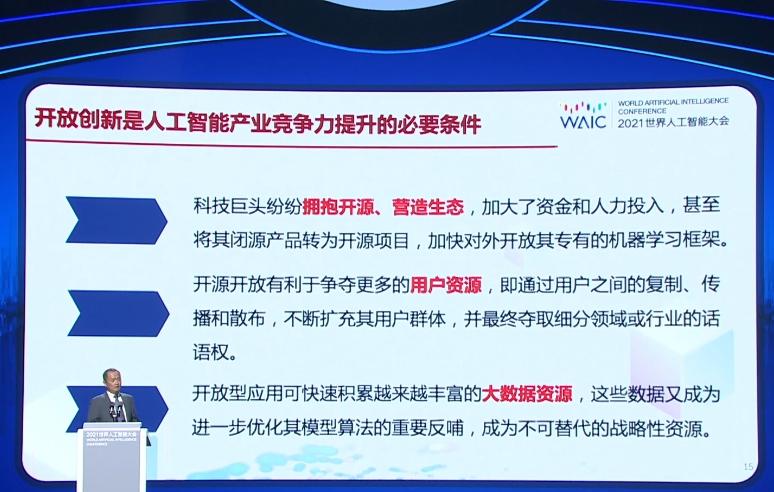Nowadays, artificial intelligence has penetrated into thousands of industries, from chip manufacturing to autonomous driving, it has continuously accelerated the development of emerging industries and become a new driving force to stimulate economic development.
The reporter learned from the World Artificial Intelligence Conference hosted by the National Development and Reform Commission and the Ministry of Industry and Information Technology on July 8 that the overall scale of China's digital economy has reached 41.4 trillion yuan, and artificial intelligence is a new engine for developing the digital economy and opening up digital life, and AI applications such as unmanned aerial vehicles have also been accelerated.

At present, various scenario-based AI applications are enabling the public to enjoy a better digital urban life and light up the new well-being of everyone's life. On the other hand, AI has also become one of the leading industries for the development of China's key development, and the new infrastructure of AI has also become an important technical support system for the development of intelligent manufacturing in China. The Ministry of Industry and Information Technology disclosed that at present, the development of intelligent manufacturing in China is showing a good trend, the market satisfaction rate of intelligent manufacturing equipment exceeds 50%, and the system solution providers with main business income of more than 1 billion yuan have reached more than 40.
According to China's latest expected construction goals, by 2023, more than 100 national standards and industry standards will be formulated and revised to support the development of Intelligent Manufacturing in China to a new level. The Ministry of Industry and Information Technology also proposed that in the future, artificial intelligence will also empower subsystems of relevant technical standards. It is revealed that artificial intelligence standards mainly include knowledge service standards such as knowledge modeling, knowledge fusion, and knowledge computing; platforms and supporting standards such as application platform architecture and integration requirements.
Mei Hong, an academician of the Chinese Academy of Sciences, proposed at the opening ceremony of the conference that open innovation is a necessary condition for the competitiveness of China's artificial intelligence industry. He introduced that at present, technology giants have embraced open source and created an ecology, increased the investment of funds and manpower, and even converted closed source products into open source projects to accelerate opening up.
With the development of AI, a new era of digital economy is opening, Mei Hong said, last year the overall scale of China's digital economy has reached 41.4 trillion yuan, it is expected that by 2025, the scale of the domestic digital economy will exceed the 60 trillion yuan mark.
In Mei Hong's view, the core driving force of this round of reform is the extensive connection of human-machine objects brought about by AI, the Internet and its extension, which is also constantly giving birth to new formats.
At the conference, meituan unmanned distribution of the latest scientific research results to participate in the exhibition. In addition to the latest unmanned delivery vehicle Magic Bag 20, which just landed in Beijing in April this year, Meituan UAV also made its debut to the public and signed a cooperation agreement with Jinshan District in Shanghai to jointly promote the landing of the country's first urban low-altitude logistics operation demonstration center in Shanghai.
Wang Pu, senior vice president of Meituan, mentioned that with the continuous advancement of artificial intelligence and other technologies in recent years, urban low-altitude flight has begun to shift from civilian shooting to large-scale commercial use. He said that the city's low-altitude logistics network will become an important opportunity for scientific and technological innovation in the next ten or twenty years, and the combination of drone + life scene is one of the best ways to build a low-altitude logistics network.
At present, Meituan has preliminarily completed the research and development of autonomous flight drones, automated airports and unmanned aerial vehicle dispatching systems, of which more than 90% of the components of the core system are independently developed by Meituan.
"Through the five self-developed technical capabilities of aircraft, navigation control, AI algorithm, route management, and communication system, we can adapt to various scenarios such as communities, shopping malls, and office buildings, so that drones and riders can form a collaborative distribution between humans and machines, and will truly realize 'everything comes home'." Mao Yinian, head of meituan's drone business, said. As of June this year, Meituan Drone has completed more than 200,000 flight tests, and delivered more than 2,500 real orders.
In addition, On the same day, Huawei's rotating chairman Hu Houkun also said at the meeting that AI technology is changing many industries, from "heaven" to "underground", from invisible to tangible. For example, the 12345 hotline in some cities has introduced artificial intelligence technologies such as automatic dispatch and AI recognition, which has made the manual dispatch that took a long time in the past developed to an AI dispatch that only takes a few seconds, improving the temperature of urban services.
In order to accelerate this process, Hu Houkun suggested that all localities take the initiative to develop artificial intelligence computing centers, make AI computing a public resource like hydropower, and guide more artificial intelligence applications to land.
He said that in the past two years, relying on Huawei's Ascend technology platform, more than 500 domestic partners have developed more than 600 AI-related applications, which has accelerated the realization of AI universal benefits while entering thousands of industries.
Image source: Meituan, World Artificial Intelligence Conference